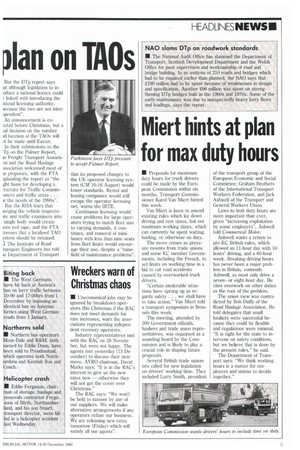Miert hints at plan for max duty hours
Page 7

If you've noticed an error in this article please click here to report it so we can fix it.
• Proposals for maximum duty hours for truck drivers could be made by the European Commission within six months, Transport Commissioner Karel Van Miert hinted this week.
Van Miert is keen to amend existing rules which lay down driving and rest times, but not maximum working times, which can currently be spent waiting, loading, or otherwise on duty.
The move comes as pressure mounts from trade unions and some EC member Governments, including the French, to set limits on working time in a bid to cut road accidents caused by overworked truck drivers.
"Certain intolerable situations have sprung up as re gards safety . we shall have to take action," Van Miert told a transport symposium in Brussels this week.
The meeting, attended by 200 Government officials, hauliers and trade union representatives, was organised as a sounding board by the Commission and is likely to play a crucial role in shaping future proposals.
Several British trade =lionists called for new legislation on drivers' working time. They included Larry Smith, president of the transport group of the European Economic and Social Committee; Graham Brothers of the International Transport Workers Federation, and Jack Ashwell of the Transport and General Workers Union.
Laws to limit duty hours are more important than ever, given "increasing exploitation by some employers", Ashwell told Commerical Motor.
Ashwell wants a return to pre-EC British rules, which allowed an 11-hour day with 10 hours' driving, and a 60-hour week. Breaking driving hours has never been a major problem in Britain, contends Ashwell, as most only drive a sevenor eight-hour day. He cites overwork on other duties as the root of the problem.
The union view was contradicted by Bob Duffy of the Road Haulage Association. He told delegates that small hauliers were successful because they could be flexible and regulations were minimal. "It is right for the state to intervene on safety conditions, but we believe that is done by the present rules," he said.
The Department of Transport says: "We think working hours is a matter for employers and unions to decide together."




































































































